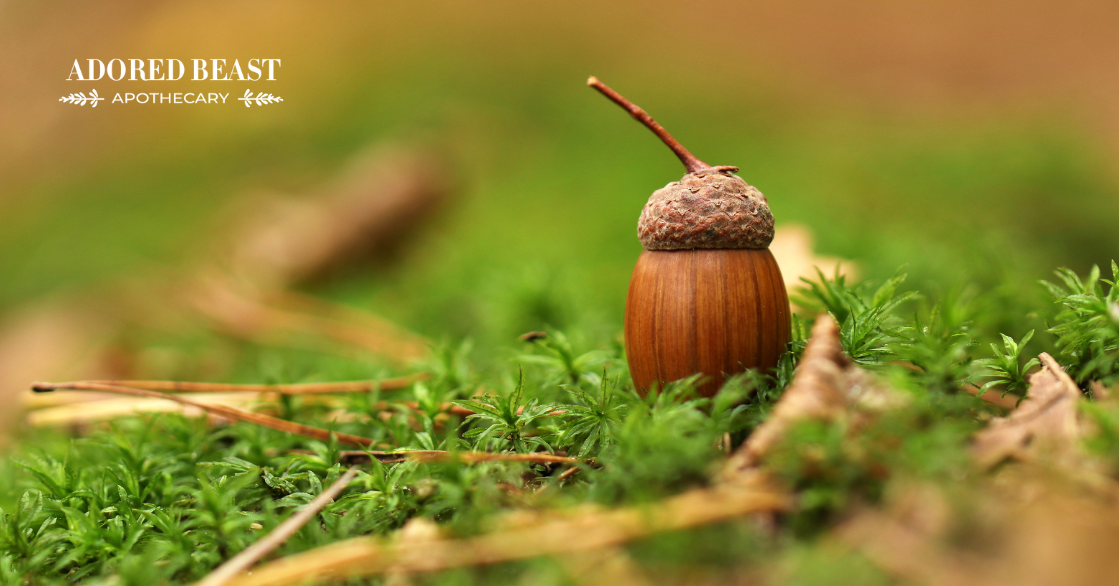Fall is a beautiful season (my absolute fave) – the cooler air, colourful leaves, and long walks with our pups through leaf-strewn paths. But while autumn brings plenty of joy, it also comes with hidden hazards for our four-legged friends. One of the biggest dangers this time of year? All those things falling from the trees – and I don’t mean the leaves…
I’m talking about acorns! Are acorns bad for dogs? Yes, they’re definitely something you want to steer clear of this season.
Let’s talk a bit about why, and what makes them so dangerous…
Are Acorns Bad for Dogs?
Acorns (also known as conkers or oak nuts, depending on where you live) are the nuts of oak trees. They drop in abundance during the fall months. While they might seem harmless, especially since squirrels and other wildlife snack on them, acorns can actually pose serious health risks to dogs if eaten.
Why? Well, acorns contain tannins, a naturally occurring chemical that can be toxic to dogs. If your canine companion eats them, this could lead to:
- Vomiting and diarrhea (sometimes with blood)
- Abdominal pain
- Loss of appetite
- Lethargy
In severe cases, the tannins can actually cause kidney and liver damage.
Plus, beyond toxicity, acorns are also a choking hazard and can cause intestinal blockages if swallowed whole, particularly in small dogs. It’s a double whammy of danger!
What to Do if Your Dog Eats an Acorn
If you see your dog eat an acorn or suspect that they may have swallowed one, it’s best to treat the situation as urgent.
Even if your dog only nibbled on part of an acorn, the tannins can cause stomach irritation and lead to vomiting or diarrhea, sometimes within a few hours. A whole acorn, or even large pieces, can also create a serious choking risk or intestinal blockage that requires medical attention.
Call your veterinarian as soon as possible and explain what happened, including an estimate of how many acorns your dog may have eaten and when. Your vet may ask you to watch for signs such as repeated vomiting, loss of appetite, lethargy, drooling, or straining to pass stool. In some cases, they might want you to bring your dog in for an exam or X-rays to check for an obstruction. Quick action and close monitoring can make a big difference in preventing more serious complications.
Tips for Walking Your Dog Safely in Fall
Autumn is acorn season. Oak trees drop hundreds – even thousands – of acorns, covering sidewalks, yards, and parks. Dogs are naturally curious, and some may chew on or swallow acorns while exploring. Puppies, especially, tend to pick up anything in their path. Because of this, fall is the time to be especially vigilant on walks.
Here are some ways to keep your dog safe during acorn season:
- Stick to clear paths – Avoid areas heavily littered with acorns when possible.
- Use a short leash – This gives you better control and keeps your pup from darting toward tempting acorns.
- Teach “leave it” – Training your dog to drop or avoid items on command can be life-saving.
- Watch closely – Keep an eye on what your dog is sniffing or mouthing during walks.
- Check your yard – If you have oak trees nearby, regularly rake up fallen acorns.
🍂 Fall walks are wonderful bonding moments with your pup – just make sure they stay safe by keeping acorns off the menu! Are acorns bad for dogs? Big time – keep them off the menu and out of your pup’s mouth!












